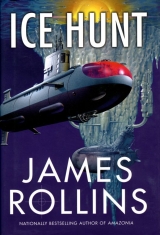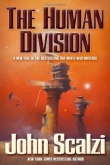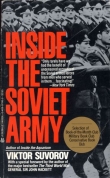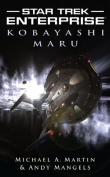
Текст книги "Ice Hunt"
Автор книги: James Rollins
Жанр:
Триллеры
сообщить о нарушении
Текущая страница: 19 (всего у книги 30 страниц)
Don’t move or we’ll blast your boat out of the water.
And he could not argue. He had no defense. Trapped in the polynya, the Drakonhad no way to maneuver, no way to escape an enemy attack. Surrounded on all sides by ice, he couldn’t even get a decent sonar sweep. While surfaced here, he was half blind.
Still, that wasn’t the greatest danger.
He stared over the shoulder of his XO and studied the radar screen. The snowstorm and wavering magnetic fluxes in the region wreaked havoc with the readings. Two helicopters sped toward him, low over the ice, making contact difficult and target locks impossible, especially in the blowing whiteout surrounding the boat.
“They’re coming in shallow, hugging ridgelines,” Gregor warned.
“I’m detecting a missile launch!” another sonar man yelled.
“Damn it!” Mikovsky glanced to the monitors feeding from exterior cameras. He could make out vague outlines of the pressure ridges surrounding the lake. The rest of the world was solid white. “Aerial countermeasures. Blow chaff!”
There was no weaker position for a sub than surfaced. He’d rather be lying on the bottom of a deep ocean trench than where he was now. And that was where he was going…to hell with whoever had pinged them. He’d rather take his chances below.
“Flood negative!” he shouted to Gregor. “Sound emergency dive!”
“Flooding negative.” A klaxon blared down the length of the boat. The submarine rumbled as ballast tanks were swamped.
“Continue blowing chaff until sail is awash!” Mikovsky swung to the crew at the fire control station. “I want to know who’s down here with us. Weapons Officer, I need a lock and solution as soon as we clear the ice.”
Nods met his orders.
Mikovsky’s attention flicked back to the video monitor. From the deck of his boat, a cloud of shredded foil belched into the air. The chaff was intended to distract the incoming missile from its true target. But the blizzard winds tore the foil away as soon as it exited from the sub, stripping the boat, leaving it exposed.
As the dive tanks flooded, the Drakondropped like a stone – but not before Mikovsky noted movement on the monitor.
A spiral of snow…coming right at them.
A Sidewinder missile.
They would not escape.
Then the sea swelled over the exterior cameras, taking away the sight.
The explosion followed next, deafening. The Drakonjolted as if struck by a giant hammer. The sub rolled, carrying the video camera back to the surface. The streaming feed on the monitor showed the back half of the polynya. Its edge was cratered away, a blasted cove. The docking bollards sailed skyward. Fire spread over ice and water.
The missile had missed! A near miss, but a miss nonetheless. A lucky blow of chaff must have pulled the weapon a few degrees off course.
But from the force of the concussion through the water, the sinking Drakonhad been shoved to the side and forced slightly back to the surface, exposing itself again. But not for long. The sub rocked stable and recommenced its stony plunge. The outside decks slipped under the sloshing water.
Mikovsky thanked all the gods of sea and men and turned away.
Then something caught his attention. On another video monitor. This camera, submerged a yard underwater, was aimed back toward the surface. The image was watery, but through the blue clarity of the polar sea, the image remained strangely vivid, limned by the flaming explosion of the Sidewinder.
On the video monitor, a soldier, dressed in polar camouflage, climbed into view on the opposite ridge. He bore a length of black tube on one shoulder, aimed square at the camera.
Rocket launcher.
A spat of fire flamed from the far end of the weapon.
Mikovsky screamed. “Ready for impact!”
He didn’t even finish his shout when the Drakonshuddered from the rocket strike. This time it was no miss.
Mikovsky’s ears popped as the rocket pierced somewhere aft, exploding a hole through the plating. An armor-piercing shell.
They were flooding. Smoke billowed into the conn. The Drakon,already heavy with water in the ballast tanks, yawed as the seawater pounded into the stern, lifting the nose. His planesman fought his controls to hold them level. Gregor leaned over him, yelling.
Mikovsky’s ears rang. He could not hear his words.
The sub continued to tilt. A clanging hammered through the captain’s temporary deafness. Additional hatches were being closed, manually and electronically, as the flooding sections of the boat were further isolated.
Mikovsky leaned against the thirty-degree tilt in the floor.
From the video monitor, he watched the nose of the Drakonbreak the water’s surface, tilting high in the air like a breaching whale, while the stern, heavy with the flood, dragged downward.
They were exposed again on the surface.
Mikovsky searched quickly for the lone warrior who had fired the rocket – then spotted him. The parka-clad man ran along the ice ridge, diving down the far side, running full tilt.
Why was he fleeing?
The answer appeared out of the blowing snow a moment later. Two helicopters, both painted as white as the blizzard, a Sikorsky Seahawk and a Sikorsky H-92 helibus. From the bus, ropes tumbled out open doors as the craft slowed. Men immediately slid down the whipping lines, weapons on backs. The helibus then swung out in a wide arc, dropping soldiers behind it, aiming for the drift station.
Mikovsky could guess the identity of the new arrivals. He had been briefed by the White Ghost.
United States Delta Force.
The other helicopter, the Seahawk, flew over the listing submarine, buzzing it like a fly over a dying bull’s nose. Mikovsky stared, sensing his doom. Under him, the Drakonsank into the sea, stern first. The best its captain could hope for was leniency for his crew, mercy from his captors.
As he prepared the order to abandon ship, the Seahawk flew right over the exterior camera. Mikovsky squinted at the monitor. Something was strange about the undercarriage of the aircraft. It took a full breath for Mikovsky to recognize what he was seeing.
Drums…a score of gray drums were attached to the Seahawk’s belly, like a clutch of steel eggs.
He recognized them on sight. All sub commanders did.
Depth charges.
He watched the first drum drop free from the Seahawk’s undercarriage, tumbling end over end toward the foundering sub.
Mikovsky had his answer to the fate of his crew.
There would be no mercy.
3:02 P.M.
USS POLAR SENTINEL
Perry stood in the Cyclops chamber, surrounded by the open Arctic Ocean. The Sentinelhad retreated a safe distance away from the fighting, remaining silent in the waters. Even their motors were stilled as they floated.
Upon the first missile strike on the surface, Perry had ordered the Sentinelto dive deep. The Drakonwas clearly under attack from the surface. This was confirmed a moment later when his sonar chief had reported a successful rocket attack. Listening from a half mile away, they had heard the explosion and the resulting bubblingof a ruptured submarine.
“It looks like the cavalry finally arrived,” Lieutenant Liang had said, grimly relieved, voicing everyone’s opinion.
The XO was probably right. The attackers had to be the Delta Force team noted in Admiral Reynolds’s last message.
Still, Perry had wanted confirmation before letting anyone know of their presence in these waters. The timing of this attack was too perfect. How had the Delta Force team crossed the blizzard to arrive so opportunely? And why hadn’t the two helicopters been heard before now? Had they been flying too high and were only picked up by the hydrophones as they made their bombing dive toward the surface?
Perry didn’t like questions he couldn’t answer – and in a submarine, paranoia was a survival trait. It kept you alive in dangerous waters.
As such, Perry stood in the forward chamber, watching the battle through the Sentinel’s window. He had wanted to see with his own eyes what was happening. He had tried to use the exterior cameras from the control bridge, but they didn’t have the zoom capability to cross the distance.
So Perry had improvised. Standing now in the Cyclops chamber, he used a set of ordinary binoculars to watch the battle.
Half a mile away, the Drakonwas nose up in the waters, silhouetted in the storm light beaming through the open lake above. She listed at close to sixty degrees, almost vertical in the water.
Perry watched, knowing that his counterpart on the other sub must be sounding the evacuation alarm. The battle was already over. The Russian crew had only one chance here: to abandon ship.
Then through the binoculars, a bright flash ignited the waters, freezing the image upon Perry’s retina before temporarily blinding him. He blinked away the dazzle as the dull explosion roared to him. It sounded exactly like a rumble of thunder, followed by the rattling of deck plates from the distant concussion.
Perry’s vision cleared. The Drakonwas fully upright, surrounded in a whirlpool of bubbles. Chunks of ice, blown down from above, rattled back up out of the depths.
The room intercom buzzed. “Captain, Conn. We’re reading a depth charge!”
Perry hurried away, tapping the intercom as he passed. “Pull us out of here!” he called out, then ducked through the hatch and ran back toward the bridge.
Another explosion shuddered through the boat, rocking the Sentinel.
These icy waters were about to get too damn hot.
3:03 P.M.
OMEGA DRIFT STATION
John Aratuk accepted death. He had seen entire villages, including his own, meet brutal and harsh ends. He had held his wife’s hand as she lay dying, trapped in the wreckage of his drunken accident. Death was a constant in his life. So as others around him shouted or cried, he sat quietly, his hands bound with plastic ties behind his back.
Another explosion shook the barracks building, setting the hanging lamps to swinging. The ice under the buildings bowed and rattled from the forces of the nearby explosions, threatening to shatter the entire area.
Around John, the military men were struggling to get free of their bonds, using whatever sharp edge they could find to saw through the tough plastic.
The Russians had bound them after Jenny and the seaman had escaped, keeping them under constant armed guard. Then a few moments ago, the Russians had fled. It was clear from their hurried departure and frantic grab for supplies that they were abandoning the base.
But why?Had they discovered what they came to find? And what was to be their own fate? These questions had been bandied about, mostly among the civilian scientists. But John had seen the answer in Lieutenant Commander Sewell’s eyes. He had overheard the conversation about the V-class incendiary bombs planted throughout the drift station. There was no doubt what was going to happen, what the Russians intended.
Then the blasts had started, rocking the ice, deafening even the storm.
“Everyone stay calm!” Sewell yelled in a firm authoritative voice. His attempt at assuredness was weakened as he almost lost his footing with another rattle of ice. He caught himself on one of the bed frames. “Panic will not help us escape!”
John continued to sit, unconcerned. Jenny had escaped. He had heard the Twin Otter buzz by overhead. John positioned his feet closer to the space heater.
At least he’d die warm.
3:04 P.M.
OUTSIDE OMEGA DRIFT STATION
Master Sergeant Kanter lay on the far side of a steep pressure ridge. The rocket launcher he had used to pierce the sub was propped beside him, but it was no longer needed. His ears ached from the concussion blows of the depth charges. Even though he was half shielded by the ridgeline, the explosions felt like punches to his solar plexus. Each one pounded at him.
He watched drum after drum drop into the sea, sink the preset ten feet, and blow. Water ballooned up, then exploded skyward, casting a funnel of water and ice high into the air. The float ice under Kanter bucked with each blow.
The wide lake of the polynya had turned into a roiling and hellish pool. Fires burned onshore. The edges of the lake were shattered. Steam flowed into the snowy blizzard, masking and shrouding the bulk of the sinking submarine. It foundered in the lake, vertical in the water, only its nose visible – and even this was sinking rapidly.
Kanter spotted a pair of Russian sailors bob up in the lake, struggling to keep their heads above water. They wore orange float suits. Evacuees, attempting to escape. It did them no good. A depth charge landed a yard from them. It blew, casting their shattered and broken forms through the air to smash against both ice and their own boat.
There would be no escape.
Farther out, the Sikorsky helibus circled the hovering Seahawk. It had dropped the remaining team members and awaited further orders. Somewhere Delta One was organizing ground forces to retake the U.S. research base.
But Kanter’s attention remained on the polynya.
The majesty of the attack was breathtaking, a symphony of ice, fire, water, and smoke. He felt each explosion down to his bones, becoming a physical part of the attack himself.
Kanter had never been prouder than at this moment.
Then he spotted movement on the flank of the dying sub.
3:06 P.M.
ABOARD THE DRAKON
Mikovsky was strapped in a seat, as were most of the key bridge crew, trying to keep some semblance of order. Their boat was dead: compartments crushed, flooding everywhere, engines almost gone. Smoke choked through the bridge, making it difficult to think, to see. The explosions deafened them. The bridge crew wore emergency air-breathing masks, but such meager safety devices would not save them – only allow them one last act of revenge.
“Message relayed through digital shortwave!” the radioman yelled from the neighboring communication shack, half his face burned by an electrical fire he had managed to put out. His words sounded as if they came from down a long tunnel, hollow and whispery.
Mikovsky glanced to his weapons officer. He got the nod he wanted. They could not carry on proper protocol, but communication was still intact. His weapons officer confirmed the fire control solution and target fix – one unlike any calculated before.
Their vessel might be doomed, but they weren’t dead.
The Drakoncarried a full complement of two-hundred-knot Shkval torpedoes, SS-N-16 antisubmarine missiles, and one pair of UGST rocket torpedoes. This last pair were the latest in Russian design, powered by a liquid monopropellant with its own oxidizer. They were mounted in special flank tubes that deployed by pushing out from the sides of the boat. It had been an accident in such a deployment that had led to the Kursktragedy back in 2000, a mishandling that led to the loss of all aboard.
There was no mishandling today.
He got the nod that the starboard UGST rocket tube was flooded and ready, target locked. All that remained was one word from him.
The last word he would ever speak.
“Fire!”
3:07 P.M.
USS POLAR SENTINEL
“I’m reading a weapons launch!” the sonar chief yelled, jerking to his feet. “Torpedo in the water!”
Perry started toward the man. “Target?”
The Polar Sentinelwas in full retreat from the hot zone. The bombardment of depth charges threatened his own boat. The cap of ice overhead trapped the concussive waves from the explosions, radiating them outward under the ice. Like dropping a cherry bomb down a toilet.
But as the Sentinelfled, Perry kept tabs on the Russian sub. He was taking no chances.
“Target does not appear to be us,” the sonar chief said.
“Then who?”
3:07 P.M.
OUTSIDE OMEGA DRIFT STATION
Frantic, Master Sergeant Kanter tried to raise Delta One. He needed to get the warning out.
“Delta One, here.”
Kanter still wore his subvocal microphone – where the barest whisper could be heard – but now he yelled. “Sir, you have to tell the Seahawk—”
He was too late. From his vantage on top of the ice ridge, Kanter saw a blast of fire ignite below the churning waterline of the foundering submarine. From the flank side of its drowned bulk, a lance of gray metal burst out of the water, leaping into the air.
The missile rocketed skyward, aimed dead center on the Seahawk helicopter hovering overhead. It was impossible for the craft to get out of the way in time.
“Christ!” Delta One screamed in his ear, spotting the danger.
The torpedo struck the helicopter. It seemed for a moment to spear completely through the Seahawk, an arrow piercing its target.
Kanter held his breath.
Then the rotors slammed into the thrusted tip of the torpedo rocket. The blast – accentuated by the two remaining depth-charge drums still attached to the helicopter’s undercarriage – shattered outward in a ball of metal and flame.
Kanter dove behind his ridgeline, seeking shelter from the rain of oil and steel, covering his head. Through the noise of the explosion, he heard the telltale whup-whupof another chopper.
He glanced back over a shoulder.
The remaining helicopter, the Sikorsky helibus, raced overhead. Kanter saw it pelted with flaming debris, cutting right through the craft. A section of the Seahawk’s broken rotor flipped end over end and crashed into the forward crew cabin. The helibus lurched over on its side, its blades chopping vertically at the air.
Kanter struggled to his feet, but the slick ice and blowing winds betrayed him. He fell. He fought again, fingers digging at the sharp ice. The toes of his boots fought for purchase.
He snapped a look up. The helibus plummeted toward him, spinning toward the crash, whipping around and around.
It was impossible to get out of the way in time.
Kanter simply rolled to his back. Staring skyward, he faced his death. “Shit…”He had nothing more profound to say and that bothered him more than anything.
3:14 P.M.
USS POLAR SENTINEL
Perry listened as stations reported their status.
He hardly heard, his mind still on what had just happened.
Moments ago, the Drakonhad sunk away and rolled into the deep ocean trench below, fading beyond crush depth. Perry had listened himself to the final bubbling as the Russian submarine gasped its last breath and was gone.
But it had not died alone.
Float ice is a great drum, transmitting sound to the waters below. Perry had heard it all happen. Then a helicopter had jammed into the cap, shattering through it. It had been visible through the periscope. The wreckage hung for a stretch, lit by the fires of its own oil and fuel. Then the surrounding ice melted from the heat of the conflagration and released its hold. The twisted wreckage sank into the sea, chasing the Drakondown into the depths.
Now all had gone dead quiet.
Perry kept his own boat running silent, patrolling the waters.
What the hell was going on? Cut off from the world, he was unsure what to do next. Should they surface and attempt to contact those who’d taken out the Russians? Was it indeed a Delta Force team or could it be a third combatant? And what about the Russian ice station? Was it still commandeered by a team of Russian ground forces?
“Sir?” Lieutenant Liang was staring at him. “Do we prepare to surface?”
That was the most logical next step – but Perry held off.
A submarine was at its most effective when no one knew it was there, and he wasn’t ready to give up that advantage. He slowly shook his head. “Not yet, Lieutenant, not yet…”
3:22 P.M.
PACIFIC SUBMARINE COMMAND
PEARL HARBOR, HAWAII
Admiral Kent Reynolds strode through the foot-thick steel blast doors of the command’s flag plot room. Already in the cavernous room were his handpicked team, experts in their fields called in last night, most buzzed from their beds and set to work here.
The heavy door shut behind him, the locks engaging.
In the center of the room stretched a long conference table, constructed of polished native koa wood, a true Hawaiian treasure in rich, dark hues – not that any of the table’s handsome surface could be seen through the piles of loose papers, books, folders, charts, and laptop computers.
Around the table, his team of communication, intelligence, and Russian experts worked singly and in small groups. Their voices were hushed, keeping private their conversations from one another. Even here, secrets were shared reluctantly among the factions gathered.
A tall, gangly fellow stepped away from one of the backlit wall maps. He wore an Armani suit minus the jacket, shirtsleeves rolled up. It was Charles Landley of NRO, the National Reconnaissance Office. A good family friend, he was married to one of Reynolds’s nieces. He had been poring over a chart of the Arctic region, a map looking directly down upon the North Pole.
He turned now, wearing a tired expression, no welcoming smile. “Admiral Reynolds, thank you for coming so quickly.”
“What is it, Charlie?”
Five minutes ago, Admiral Reynolds had been interrupted from a conference call with COMSUBLANT, his counterpart on the Atlantic coast, but Charles Landley wouldn’t have summoned him away unless it was urgent.
“SOSUS has picked up a series of explosions.”
“Where?” SOSUS was an ocean-based listening system of linked hydrophones. It could pick up a whale’s fart anywhere in the seven seas.
Charlie stepped to the wall and tapped a spot on the map. “We believe with eighty-five percent probability that it was at the coordinates of the Omega Drift Station.”
Admiral Reynolds had to take a deep breath. Fear for his daughter, Amanda, always present these last hours, flared to an ache behind his sternum. “Analysis?”
“We believe it was a series of depth charges. We also detected signature bubbling of an imploding submarine.” Charlie lifted one eyebrow. “Prior to these strong detects, we also picked up what sounded like helicopter bell beats…but they were too weak to say for certain.”
“A strike team?”
Charlie nodded. “That is what current intel believes. Without pictures from the Big Bird recon satellite, we’re blind to what’s going on.”
“How long until the spy platform is clear of the solar storm?”
“At least another two hours. In fact, I believe that is why the Russians dragged their feet for two weeks after being leaked news of the Arctic discovery. They were waiting for this blackout window to open so they could proceed free of spying eyes.”
“And the strike team that sank the sub?”
“We’re still working on that data. It could be either a secondRussian assault team – in which case, it was the Polar Sentinelthat was sunk. Or it’s our Delta Force team, and the Drakonhas been scuttled.”
Admiral Reynolds allowed himself a moment of hope. “It has to be the Delta Force team. The word I’ve gleaned from Special Forces is that the Delta teams were deployed in advance of the Russian attack.”
Charlie stared at him, eyes pinched, pained. The admiral braced himself for his friend’s next words. Something was wrong.
“I’ve learned something else.” These words were spoken in hushed tones.
Admiral Reynolds’s gaze flicked to the team gathering and collating data. Charlie had not shared whatever he had discovered with these others. The admiral sensed the next bit of news was the true reason he had been so urgently summoned. The throbbing behind his ribs grew more lancing.
Charlie led him over to a side table under one of the maps. A titanium laptop rested atop it, floating the NRO icon over its flat-screen monitor. Charlie booted the laptop and typed in his security code. Once it was up and running, he opened a file that required him to place his thumb over a glowing print-reader to open.
Stepping away, Charlie waved him forward.
Admiral Reynolds leaned toward the screen. It was a Pentagon memo stamped top secret. It was dated over a week ago. The heading was in bold type: GRENDEL OP.
Charlie shouldn’t have been able to access this file, but NRO moved within its own channels. Its organization had its fingers and eyes everywhere. His friend deliberately concentrated on the wall map of Asia. It had nothing to do with the current situation, but he kept his attention focused there anyway.
Slipping a pair of reading glasses from a pocket, Admiral Reynolds leaned closer and read the message. It was three pages. The first section detailed what was known about the history of the Russian ice station. As he read, Admiral Reynolds found his vision blurring, as if his body were physically trying to deny what it was seeing. But there could be no doubt. The dates, the names, were all there.
His gaze settled on the words human experimentation. It took him back to his father’s war stories, of the liberation of Nazi concentration camps, of the atrocities committed within those dark halls.
How could they…?
Sickened, he continued to read. The last part of the report detailed the U.S. military’s response: the purpose, the objectives, the endgame scenarios. He read what was hidden at the ice station and the ultimate mission statement of Grendel ops.
Charlie reached a hand to his shoulder as he straightened, steadying him, knowing he would need it. “I thought you deserved to know.”
Admiral Reynolds suddenly found it hard to breathe. Amanda…The pain behind his sternum stabbed outward, lancing down his left arm. Bands of steel wrapped around his chest and squeezed.
“Admiral…?”
The hand tightened on his shoulder, catching him as his legs weakened. Through a haze, he noted others in the room slowly turning their way.
Somehow he was on the floor, on his knees.
“Get help!” Charlie shouted, half cradling him.
Admiral Reynolds reached up and clutched at Charlie’s arm. “I…I need to reach Captain Perry.”
Charlie stared down at him, his eyes bright with worry and sorrow. “It’s too late.”








